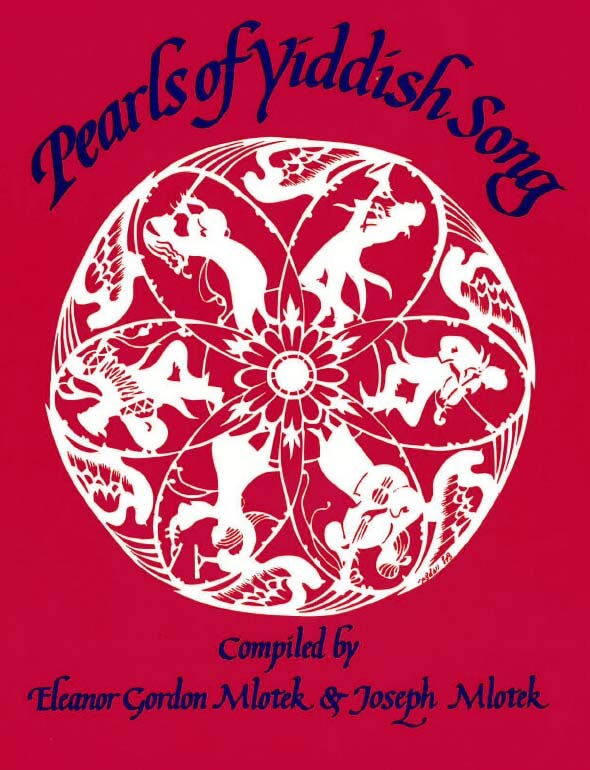Love song popular in Poland and the United States from a poem originally entitled “Mirkes libe” (Mirke’s love). Written by Z. Segalovitch (1884-1949). It was sung by both compilers in Warsaw and New York.

Black eyes have fire…
Yours are black,
have thrown hot sparks
into my womanly heart.
You call me Yehudis, call me Shulamis,
you look for me everywhere —
I love a bold suitor,
if you are bold, then come!
I will only tease the bold one,
and play with his happiness;
I’ll torment you with love,
be a hero — conquer!
Your flowers and presents,
I gave them away today.
Your wild behavior,
I told everyone about it.
Now all the girls
will make fun of you.
Now you will wait for long hours
at my door…
But you can’t see through the windows,
how my eyes still follow you;
You are still precious and dear to me
though I swell up from the victory.
You are gone… but I have not found
my rest again;
Others come, but none of them
loves me like you.
Can it be, that my dream
deceived me?
Can it be, that you will not come?
I am waiting, so many days…
With the colors of my loneliness
I paint your picture,
but those eyes, your eyes
burn so fiercely…
You will yet come, you will yet feel
how my heart s longing;
Black eyes have fire —
and yours are black.
Shvartse oygn hobn fayer…
Dayne zaynen shvarts,
Host gevorfn heyse funken
In mayn meydish harts.
Rufst mikh Yehudis, rufst Shulamis,
Zukhst mikh umetum —
Ikh hob lib a dreyst bokher,
Bistu dreyst, dan kum!
Nor dem dreystn vel ikh reytsn,
Shpiln mit zayn glik;
Kh’vel dikh paynikn mit libe,
Zay a held — bazigl
Dayne blumen un matones
Hob ikh haynt tseteylt,
Dayne vilde shtiferayen
Alemen dertseylt.
Itster veln ale meydlekh
Oplakhn fun dir,
Itster vestu lange shoen
Vartn bay mayn tir. . .
Nor du zest nisht durkhn fentster
Loyft dir nokh mayn blik;
Bist mir lib nokh, bist mir tayer,
Khotsh ikh kvel fun zig.
Bist avek. . . nor nisht gefunen
Hob ikh mer mayn ru;
S’kumen andere, nor keyner
Libt mikh nit vi du.
Ken dos zayn den, az mayn kholem
Hot mikh opgenart?
Ken dos zayn, du zolst nisht kumen?
Vifl teg ikh vart. . .
Mit di farbn fun mayn umet
Mol ikh oys dayn bild,
Nor di oygn, dayne oygn
Branen azoy vild. . .
Vest nokh kumen, vest nokh filn,
Vi es benkt mayn harts;
Shvartse oygn hobn fayer —
Dayne zaynen shvarts. . .
שװאַרצע אױגן האָבן פֿײַער. . .
דײַנע זײַנען שװאַרץ,
האָסט געװאָרפֿן הײסע פֿונקען
אין מײַן מײדלש האַרץ.
רופֿסט מיך „יהודית‟, רופֿסט „שולמית‟,
זוכסט מיך אומעטום —
איך האָב ליב אַ דרײסטן בחור,
ביסטו דרײסט, דאַן קום!
נאָר דעם דרײסטן װעל איך רײצן,
שפּילן מיט זײַן גליק;
כ’װעל דיר פּײַניקן מיט ליבע,
זײַ אַ העלד — באַזיג!
דײַנע בלומען און מתּנות
האָב איך הײַנט צעטײלט,
דײַנע װילדע שטיפֿערײַען
אַלעמען דערצײלט.
איצטער װעלן אַלע מײדלעך
אָפּלאַכן פֿון דיר,
איצטער װעסטו לאַנגע שעהען
װאַרטן בײַ מײַן טיר. . .
נאָר דו װעסט נישט: דורכן פֿענצטער
לױפֿט דיר נאָך מײַן בליק;
ביסט מיר ליב נאָך, ביסט מיר טײַער,
כאָטש איך קװעל פֿון זיג.
ביסט אַװעק. . . נאָר נישט געפֿונען
האָב איך מער מײַן רו;
ס’קומען אַנדערע, נאָר קײנער
ליבט מיך ניט װי דו.
קען דאָס זײַן דען, אַז מײַן חלום
האָט מיך אָפּגענאַרט?
קען דאָס זײַן, דו זאָלסט נישט קומען?
װיפֿל טעג איך װאַרט. . .
מיט די פֿאַרבן פֿון מײַן אומעט
מאָל איך אױס דײַן בילד,
נאָר די אױגן, דײַנע אױגן
ברענען אַזױ װילד. . .
װעסט נאָך קומען, װעסט נאָך פֿילן,
װי עס בענקט מײַן האַרץ;
שװאַרצע אױגן האָבן פֿײַער —
דײַנע זײַנען שװאַרץ. . .
Song Title: Shvartse Oygn Hobn Fayer

First published in 1988 as Pearls of Yiddish Song: Favorite Folk, Art and Theatre Songs, this anthology contains 115 songs. Some material had never been published, while others, included in rare song collections or sheet music, were largely inaccessible. The songs presented reflect Jewish life in Eastern Europe and the United States and depict childhood, love, family celebrations, poverty, work and struggle. There are also songs from the Hasidic and Maskilic movements, songs of Zion and of America, as well as songs from the Yiddish theater.
The title of this anthology derives from the weekly two-page feature column “Pearls of Yiddish Poetry,” which the compilers Yosl and Chana Mlotek initiated in 1970 in the Yiddish newspaper Der Forvertz (the Yiddish Daily Forward). Hundreds of readers from around the world — including authors, composers, singers, actors — became co-participants in this collective folk project and recalled melodies, lines, fragments, stanzas and their variants of songs, poems, and plays which they had heard in their youth. At first, readers sent in only written material. Later, they also taped songs on cassettes, many of whose melodies had, until then, never been recorded. They also identified and supplied missing information regarding lyricists, poets, and composers and described the circumstances surrounding the songs’ origins, their dissemination, diffusion and impact.